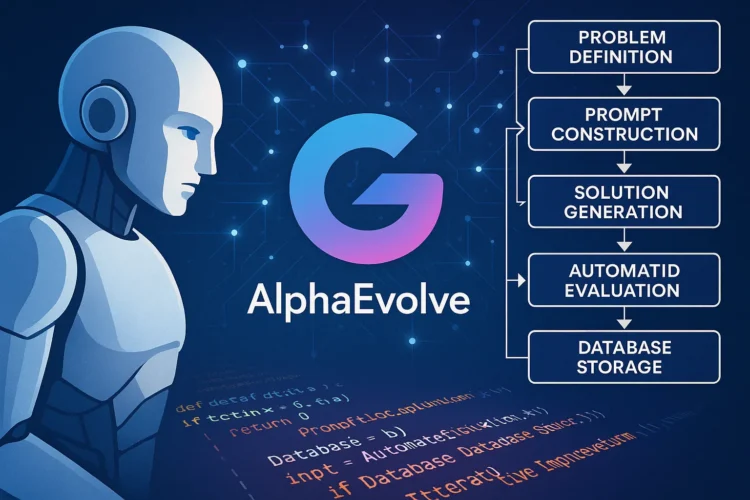In a significant advancement for artificial intelligence research, Google DeepMind has unveiled AlphaEvolve, an evolutionary coding agent that combines the creative capabilities of large language models (LLMs) with automated evaluation systems to discover novel algorithms across mathematics, computer science, and real-world applications. This groundbreaking system represents a major step toward self-improving AI that can autonomously generate new knowledge and optimize existing computational systems.
The Evolution of Algorithmic Discovery
AlphaEvolve represents a paradigm shift in how algorithms are discovered and optimized. Traditional algorithm development relies heavily on human expertise and insight, often taking months or even years to produce meaningful advancements. AlphaEvolve dramatically accelerates this process by autonomously exploring solution spaces and iteratively improving algorithms through a feedback-driven evolutionary approach.
The system builds upon Google DeepMind’s previous work with FunSearch, which demonstrated that LLMs could generate functions to help discover new solutions to open scientific problems. However, AlphaEvolve significantly expands these capabilities, evolving entire codebases rather than single functions and developing much more complex algorithmic solutions.
“AlphaEvolve is an agent that can go beyond single function discovery to evolve entire codebases and develop much more complex algorithms,” explains Google DeepMind in their announcement. This capability for holistic code evolution enables the system to address problems of unprecedented complexity and scale.
Technical Framework: How AlphaEvolve Works
At its core, AlphaEvolve employs principles of evolutionary computation combined with state-of-the-art language models. The system operates through a continuous loop of proposal, evaluation, and refinement, mimicking the process of natural selection.
The Evolutionary Process
The process begins when a human defines a problem and provides an evaluation mechanism. The user can specify a task, along with evaluation criteria that objectively measure the quality of potential solutions. Importantly, these criteria must be programmatically verifiable, allowing for automated assessment without human intervention.
AlphaEvolve then enters its evolutionary cycle:
- Problem Definition: A human provides a problem description and evaluation criteria
- Prompt Construction: The system crafts prompts incorporating the problem, hints, and past research
- Solution Generation: An ensemble of LLMs generates potential solutions as code
- Automated Evaluation: Solutions are tested against objective metrics
- Database Storage: Successful solutions are stored and ranked
- Iterative Improvement: The best solutions inform subsequent generations9
This feedback loop enables AlphaEvolve to continuously refine its solutions, converging toward increasingly optimal algorithms.
The LLM Ensemble
AlphaEvolve leverages an ensemble of state-of-the-art language models from Google’s Gemini family. Specifically, it combines Gemini Flash, which maximizes the breadth of exploration due to its speed and efficiency, with Gemini Pro, which provides critical depth with more insightful but slower suggestions.
“You can think of it as Gemini Flash, with its lower latency, enables a higher rate of candidate generation,” notes one researcher. “This increases the number of ideas explored per unit of time. Meanwhile, Gemini Pro provides occasional higher-quality suggestions that can significantly advance the evolutionary search and potentially lead to breakthroughs”.
This dual-model approach creates a balance between exploration and exploitation-trying many different approaches quickly while also deeply pursuing promising avenues.
Evaluation Mechanisms
What distinguishes AlphaEvolve from standard LLM-based code generation is its sophisticated evaluation system. Each proposed solution is automatically evaluated against clear, objective metrics that determine its quality and correctness.
The evaluation can include:
- Evaluation Cascades: Solutions are tested on progressively more difficult cases to quickly filter out unpromising candidates
- Multi-Objective Scoring: Multiple performance metrics can be simultaneously optimized
- Parallelized Evaluation: Multiple solutions can be tested concurrently to accelerate the process
This evaluation-driven approach ensures that AlphaEvolve avoids the pitfalls of traditional LLMs, which may generate plausible but incorrect solutions. Instead, it only builds upon demonstrably correct and high-performing algorithms.
Groundbreaking Achievements in Mathematics and Computer Science
AlphaEvolve has already demonstrated remarkable capabilities in solving complex problems that have stumped human researchers for decades.
Advancing Matrix Multiplication
One of AlphaEvolve’s most significant achievements is discovering a new algorithm for 4×4 complex-valued matrix multiplication using only 48 scalar multiplications, improving upon Volker Strassen’s algorithm from 1969 that required 49 multiplications. This represents the first improvement in this specific mathematical problem in 56 years.
“For these 4×4 matrices, AlphaEvolve identified an algorithm that outperforms Strassen’s from 1969 for the first time in that context,” noted Matej Balog, a Google DeepMind researcher. According to the research paper, “AlphaEvolve improves the state of the art for 14 matrix multiplication algorithms”.
While a single multiplication step reduction might seem minor, at Google’s scale-where matrix multiplications are performed trillions of times daily-this optimization translates to significant computational savings.
Solving Open Mathematical Problems
Beyond matrix multiplication, AlphaEvolve was applied to over 50 open problems across mathematical analysis, geometry, combinatorics, and number theory. The system rediscovered state-of-the-art solutions in approximately 75% of cases and, remarkably, improved upon the best known human-derived solutions in about 20% of cases.
A standout example is the “kissing number problem,” a centuries-old geometric challenge that seeks to determine the maximum number of non-overlapping unit spheres that can simultaneously touch a central sphere. In 11 dimensions, AlphaEvolve discovered a configuration featuring 593 spheres, surpassing the previous record of 592 spheres.
These mathematical breakthroughs demonstrate that AlphaEvolve can not only match human mathematical prowess but also surpass it in certain domains.
Real-World Impact: Optimizing Google’s Computing Ecosystem
AlphaEvolve’s capabilities extend well beyond theoretical mathematics, delivering tangible benefits to Google’s computing infrastructure over the past year.
Data Center Efficiency
One of AlphaEvolve’s most impactful applications has been optimizing Borg, Google’s vast data center orchestration system. The system discovered a remarkably simple yet effective heuristic function that has been deployed across Google’s entire fleet for over a year.
This optimization continuously recovers an average of 0.7% of Google’s worldwide compute resources, which would otherwise be stranded. While this percentage might seem small, at Google’s scale it represents enormous efficiency gains and cost savings.
Importantly, the solution generated by AlphaEvolve offers significant operational advantages beyond raw performance:
“The alpha evolve solution was chosen over deep reinforcement learning because its code solution not only leads to better performance but also offers clear advantages in interpretability, debugability, predictability, and ease of deployment”.
Hardware Design Optimization
AlphaEvolve has also contributed to hardware design by optimizing a critical arithmetic circuit within Google’s Tensor Processing Units (TPUs). The system proposed a Verilog rewrite that removed unnecessary bits in a key, highly optimized circuit for matrix multiplication.
This proposal passed rigorous verification methods to confirm functional correctness and has been integrated into an upcoming TPU design. By suggesting modifications in the standard language of chip designers, AlphaEvolve demonstrates the potential for collaborative design between AI and hardware engineers.
Self-Improvement: Enhancing AI Training and Inference
Perhaps most remarkable is AlphaEvolve’s ability to improve the very systems that enable its own operation-truly exemplifying self-improving AI.
Accelerating Gemini’s Training
AlphaEvolve discovered a more efficient approach to matrix multiplication kernels used in training Gemini language models. This optimization achieved a 23% speedup for this specific component, leading to a 1% reduction in Gemini’s overall training time.
Given the enormous computational resources required for training modern AI models, even this seemingly modest 1% improvement translates to substantial energy and cost savings at scale.
Optimizing Transformer Architecture
The system also improved the implementation of FlashAttention, a critical component in transformer-based AI models. AlphaEvolve achieved up to a 32.5% speedup for this kernel implementation, significantly enhancing inference performance.
Most impressively, AlphaEvolve accomplished these optimizations in days through automated experimentation, compared to the months of expert engineering effort typically required.
Beyond Previous Systems: How AlphaEvolve Advances AI Research
AlphaEvolve represents a significant evolution beyond previous AI systems designed for algorithmic discovery.
Comparison with FunSearch
While AlphaEvolve builds on the foundational concepts of FunSearch, it offers several key advancements:
- Scale: AlphaEvolve can evolve entire codebases with hundreds of lines of code, not just single functions with 10-20 lines
- Language Support: It works across any programming language, not just Python
- Evaluation Complexity: It can handle evaluations taking hours on accelerators like GPUs or TPUs, not just quick evaluations under 20 minutes on a CPU7
These enhancements enable AlphaEvolve to tackle problems of far greater complexity and practical significance than its predecessors.
Limitations and Constraints
Despite its impressive capabilities, AlphaEvolve has important limitations that define its scope of application.
The most significant constraint is its dependency on problems with clear, programmatically verifiable evaluation metrics. As explained in the research: “Tasks that require manual experimentation are not in the scope”. This restriction means that while AlphaEvolve excels at mathematical and computational problems with definitive right or wrong answers, it cannot currently address problems requiring subjective human judgment or physical experimentation.
Additionally, AlphaEvolve typically requires some initial code as a starting point. While this code can be rudimentary-“consisting of single-line functions that return constants of the appropriate type”-it still necessitates some human guidance to begin the evolutionary process.
Future Implications and Potential Applications
AlphaEvolve represents a significant step toward truly autonomous AI research systems capable of making discoveries without constant human oversight.
The technology shows particular promise for optimization problems across various domains-any challenge where success can be objectively measured and automatically evaluated. Potential future applications could include:
- Scientific Research: Discovering new algorithms for protein folding, genomics, or drug discovery
- Engineering Optimization: Enhancing the efficiency of renewable energy systems or structural design
- Financial Systems: Optimizing trading algorithms or risk assessment models
- Climate Modeling: Improving the accuracy and efficiency of climate prediction algorithms
While currently used within Google’s infrastructure, DeepMind plans to expand access through an Early Access Program for select academic researchers, with a user-friendly interface in development.
Conclusion: The Dawn of Self-Improving AI Systems
AlphaEvolve represents a watershed moment in the development of autonomous AI systems capable of generating new knowledge. By combining the creative potential of large language models with the rigor of automated evaluation and the progressive improvement of evolutionary algorithms, Google DeepMind has created a system that can not only match but often exceed human capabilities in algorithm design.
The real-world deployment of AlphaEvolve’s discoveries-from data center optimizations to hardware design improvements-demonstrates that AI-generated algorithmic innovations can deliver tangible benefits at scale. As one researcher noted, “In my prior experiences with machine learning research, it was uncommon to create a scientific tool that could immediately demonstrate real-world impact at this scale. This is exceptional”.
As AlphaEvolve continues to evolve and similar systems emerge, we may be witnessing the beginning of a new era in which AI systems autonomously advance scientific knowledge and technological capability-potentially accelerating progress across numerous fields in ways that were previously unimaginable.

















